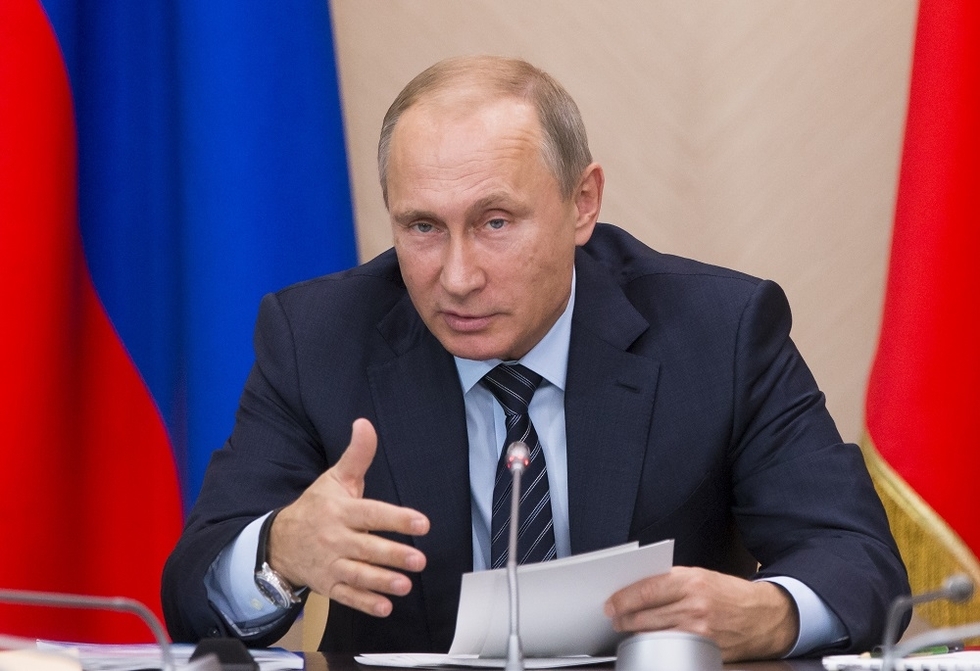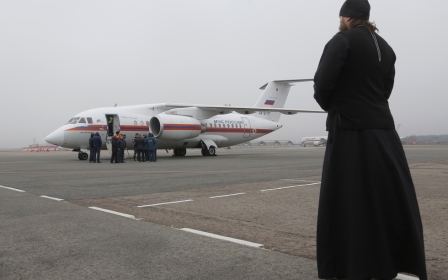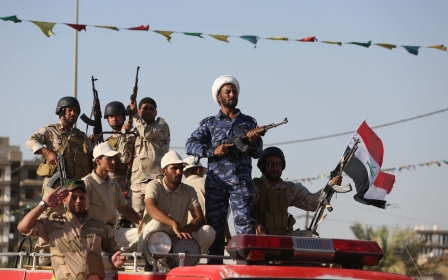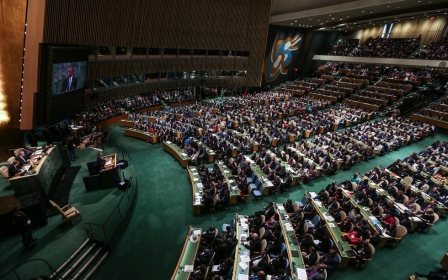Putin in Tehran: Sealing a marriage of convenience?

On Monday, Russia’s President Vladimir Putin visited Tehran for the first time in eight years, scheduling meetings with senior figures, including Iranian President Hassan Rouhani and the country’s highest authority, the Supreme Leader Ayatollah Khamenei.
The “Tsar of the East” - as the Russian leader was described by Etemad, a reformist Iranian outlet - travelled to the Iranian capital for the third summit of the Gas Exporting Countries Forum. Putin was joined by seven other heads of states which collectively produce approximately 42 percent of global gas output.
Putin’s participation in the forum, together with the high level side-line meetings arranged during his short stay, indicate that the two countries saw this as an opportunity to outwardly show their strengthened bilateral ties, both on economic exchanges and on foreign policy issues.
The Russian delegation travelling to Tehran included not only high level politicians such as Foreign Minister Sergei Lavrov, but also energy industry representatives including Gazprom CEO Alexey Miller and Rosneft head Igor Sechin.
According to Kremlin advisor Yuri Ushakov, first and foremost Moscow was interested in discussing how to boost trade relations and energy cooperation. Both sides signed agreements in the energy, medical and transport sectors, including Russian plans to finance the building of two pipelines in Iran, although it is unclear if the $21 billion in export deals Russia was hoping for have materialised.
Although enthusiasm in trade relations between Russia and Iran is not new, Russia has recently been visibly stepping up its economic cooperation with Iran.
Russia recently announced that it planned to open a $5 billion credit line to Iran, and in November Russia agreed to open a joint bank once sanctions are lifted to finance joint economic projects. These efforts are in part because of both sides’ understandable interest in seizing opportunities from the softening of sanctions on Iran after the recently negotiated nuclear deal.
One reformist Iranian news outlet, Sharq, focused on the economic aspects of the visit, defining it as "an important opportunity to overcome the sanctions". However, it is also because it strengthens an “alternative” alliance to counter-balance the West’s influence at a time of tension.
Russia and Iran both align on their desire for a more multipolar world and on their discontent towards perceived US hegemony in international affairs. The strength of Russia’s relations with Iran has been perceivably linked to Russia’s relations with the West.
For example, Russia banned an existing contract to sell Iran S-300 surface-to-air missile systems after new UN sanctions were introduced, but also allegedly under added pressure from Western partners.
Against the backdrop of poorer relations with the US and Europe, in November 2015 Russia signed a new deal with Iran to supply the S-300. Khamenei praised Putin for "neutralising Washington's plots" and said economic ties between the two countries could "expand beyond the current level".
Despite the gas forum highlighting the potential for growing business ties between Russia and Iran, there clearly also were broader geopolitical reasons for meeting. The Syrian crisis was the main topic discussed by Khamenei and Putin in their two-hour meeting, during which the Supreme Leader hailed Russia's effective role in Syria. The two countries have been fighting on the same front since the uprising broke out in 2011.
Iran has been sending in advisors and boots on the ground, while Russia has provided advanced military power to back President Bashar al-Assad.
Both sides were deliberate in their show of solidarity on their joint approach to Syria. A Kremlin spokesperson said Iran and Russia have a “unity of views” on Syria.
Following the visit, Putin said that Russia and Iran will “continue coordination in the fight against terrorism” and “strengthen collaboration as part of the International Syria Group”.
Iranian President Rouhani similarly stated that “when it comes to combating terrorism, some countries are just talking and carrying out showy actions, but Iran and Russia have shown that they are serious about the fight” in Syria.
This alignment has also in part been motivated by a shared desire to reduce US influence on the trajectory and outcome of the conflict. This was highlighted by recent comments. A Kremlin official was quoted as saying that Russia and Iran will jointly oppose “external attempts” at regime change in Syria, putting up a united front against the removal of Assad. Khamenei said the US had a "long-term plan" to dominate Syria and the Middle East that would "disadvantage all countries, especially Iran and Russia … This threat should be neutralised wisely and with closer interaction."
The two leaders’ statements seem to counter the rumours about Iranian and Russian cooperation in Syria falling apart as a result of Moscow’s decision to step up its military intervention in Syria at the end of September. Both countries have in fact endorsed the proposal agreed in Vienna on 14 November, according to which “free and fair elections” would be held according to a new constitution within 18 months.
The plan, however, says nothing about Assad’s fate, a point on which Russia and Tehran might be at odds. In their meeting, Putin and Khamenei stressed that Assad is the "chosen and legitimate" president of Syria. However, despite Putin’s comments in Tehran, speculation has emerged about Moscow being more prepared to see Assad phased out of power as part of a deal, compared to Tehran.
Iran’s alleged commitment to maintain Assad in power is linked to the leadership’s concern that no other ruling figure will enable Iran to maintain its influence in western Syria, preserving access to Lebanon to arm its military proxy, Hezbollah, and keeping in place its front against Israel.
Russia, on the other hand, is mostly interested in retaining strong state institutions and in preserving the presence of its navy in the Mediterranean. With these strategic goals in mind, Moscow is not willing to alienate other regional powers in favour of Iran, as shown by the recent meeting with Saudi Arabia and, most annoyingly to Iran, Israel.
Questions thus remain on how far Iran and Russia would agree on a full political settlement. As the two countries’ interests and long-term ambitions in a future Syria might compete, the current marriage of convenience between Moscow and Tehran, aimed at countering the rebel front in the crisis, could weaken or collapse once the fighting subsides.
New MEE newsletter: Jerusalem Dispatch
Sign up to get the latest insights and analysis on Israel-Palestine, alongside Turkey Unpacked and other MEE newsletters
Middle East Eye delivers independent and unrivalled coverage and analysis of the Middle East, North Africa and beyond. To learn more about republishing this content and the associated fees, please fill out this form. More about MEE can be found here.




